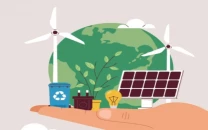Big industries expand 7.6% in Jul-Jan
LSM index rises on back of increase in output of almost all major industries

Large industries of Pakistan posted 7.6% growth in the first seven months of current fiscal year on the back of increase in output of almost all major industries after the downward growth paused for the first time in five months.
The pace of growth in large-scale manufacturing (LSM) industries increased to 7.6% during July-January of fiscal year 2021-22, the Pakistan Bureau of Statistics (PBS) reported on Friday.
It was the second growth figure released by the PBS under the new base year of 2015-16. The new base covers additional industries and their products compared to the old base of 2005-06.
On the basis of old methodology, the LSM growth rate stood at 3.9% in the first seven months of current fiscal year.
In January, the downward trend paused for the first time in five months. The year-on-year LSM growth increased 8.2% in January over the same month a year ago.
Since large industries contribute heavily to revenue collection and job creation, any change in their growth impacts the government and business sentiment accordingly.
Prime Minister Imran Khan has announced a tax amnesty scheme for the country’s industrialists, allowing them to legalise their ill-gotten and tax-evaded money at a rate of 5% by waiving 49% taxes.
However, the International Monetary Fund (IMF) has raised objections over the tax amnesty scheme, which is the third in as many years and is against the tax compliance culture. There has been a constant decline in the share of LSM, as the industrialists find refuge in real estate and the stock market.
The government has targeted 4.8% economic growth for the current fiscal year. However, the IMF has projected that Pakistan’s economic growth would stand at 4%, which is a decent rate but nearly half of what is required to create jobs for all new entrants into the market.
The overall economic growth may also be impacted by the government’s decision to slash the Public Sector Development Programme (PSDP) by Rs300 billion.
LSM data is collected from three different sources. Data collected by the Oil Companies Advisory Council (OCAC) showed that the growth in 36 items remained almost flat at 0.5% in the first seven months of current fiscal year.
The Ministry of Industries, which monitors 11 products, reported 6.9% increase in output during the July-January period.
Provincial bureaus reported 9.7% growth in the output of 76 goods, stated the PBS. Earlier, the provincial bureaus were monitoring the output of 65 items.
The industries that posted growth in the first seven months of FY22 included textile, which grew 2.9%.
The weight of textile sector has gone down from nearly 21% to 18.2% in the LSM index. It is still the largest sector in the index.
The output of food industry increased 3.4% during the period under review. Beverages sector production grew 2.5%.
Coke and petroleum products output showed 8.2% growth but chemicals output increased only marginally.
The output of automobile sector increased 63.5%. Iron and steel sector saw a growth of 17.5% while the manufacturing of leather products rose 4.5%. Paper and board sector grew 8.2% and wood products output increased 172%.
There was a dip in the output of fertiliser plants as the government struggled to provide gas to urea producers to enable them to operate at full capacity. This negates the Ministry of Industries’ claim that urea output was the highest in the current fiscal year.
The Economic Coordination Committee (ECC) of the cabinet on Thursday approved a fertiliser subsidy of Rs24 billion after the Ministry of National Food Security and Research disclosed that due to high prices and less availability of fertiliser the output of Kharif crops would decline in the current year.
Pharmaceutical, rubber and electronics output also contracted during the first seven months of current fiscal year, according to the PBS.
Published in The Express Tribune, March 19th, 2022.
Like Business on Facebook, follow @TribuneBiz on Twitter to stay informed and join in the conversation.



















COMMENTS
Comments are moderated and generally will be posted if they are on-topic and not abusive.
For more information, please see our Comments FAQ